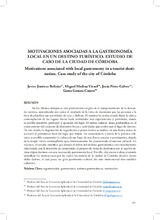Motivaciones asociadas a la gastronomía local en un destino turístico. Estudio de caso de la ciudad de Córdoba
Motivations associated with local gastronomy in a tourist destination. Case study of the city of Córdoba
Autor
Jiménez-Beltrán, Francisco Javier
Medina Viruel, Miguel Jesús
Pérez-Gálvez, Jesús C.
Gómez-Casero Fuentes, Gema
Editor
UCOPressFecha
2021Materia
SegmentaciónGastronomía
Turismo gastronómico
Motivación
Segmentation
Gastronomy
Gastronomic tourism
Food tourism
Motivation
METS:
Mostrar el registro METSPREMIS:
Mostrar el registro PREMISMetadatos
Mostrar el registro completo del ítemResumen
En los últimos tiempos se está produciendo un giro en el comportamiento de la demanda turística, entendiendo ésta como el resultado de la toma de decisiones que las personas a la hora de planificar sus actividades de ocio y disfrute. El turismo ha evolucionado desde la clásica contemplación de los lugares físicos hacia actividades más experienciales y profundas, donde es posible descubrir, participar y aprender del lugar. El turista cultural, desea profundizar en el conocimiento del conjunto de elementos físicos y actividades que conforman el lugar de destino. De este modo, la degustación de ingredientes y platos locales se traduce en una forma única de acercarse al patrimonio local del lugar que visitan. En consecuencia, a través de la práctica culinaria es posible comprender la cultura de un lugar de una forma cercana y participativa, alejada de la simple visión contemplativa que, históricamente, ha caracterizado al turismo cultural. En resumen, el estudio científico que aborda el análisis del turismo gastronómico está estrechamente relacionado con la intención de comprender el proceso de toma de decisiones por el que los turistas eligen destinos con una reconocida gastronomía local. Por ello, el presente trabajo pretende identificar las motivaciones por las cuales los turistas de la ciudad de Córdoba deciden visitar dicho destino, el cual posee un gran patrimonio cultural (no solo monumental sino también culinario). In recent times there has been a shift in the behavior of tourist demand, understanding this as the result of the decision-making that people make when planning their leisure and enjoyment activities. Tourism has evolved from the classic contemplation of physical places towards more experiential and profound activities, where it is possible to discover, participate and learn from the place. The cultural tourist, wishes to deepen the knowledge of the set of physical elements and activities that make up the destination. In this way, the tasting of local ingredients and dishes is translated into a unique way of getting closer to the local heritage of the place they visit. Consequently, through culinary practice it is possible to understand the culture of a place in a close and participatory way, away from the simple contemplative vision that, historically, has characterized cultural tourism. In summary, the scientific study that addresses the analysis of gastronomic tourism is closely related to the intention of understanding the decision-making process by which tourists choose destinations with a recognized local gastronomy. For this reason, this work aims to identify the motivations why tourists from the city of Córdoba decide to visit this destination, which has a great cultural heritage (not only monumental but also culinary).

